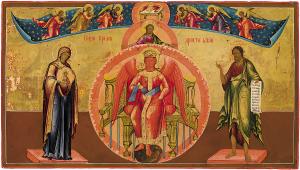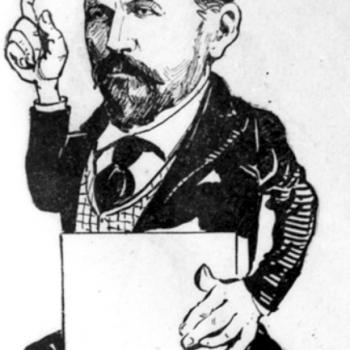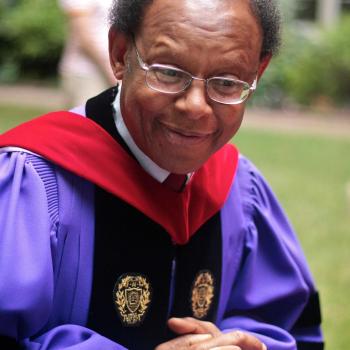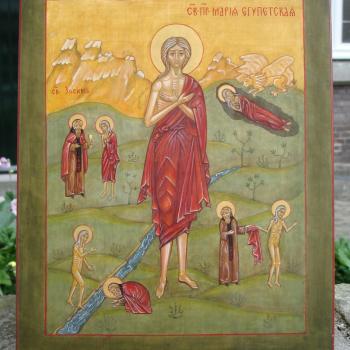
Wisdom, according to the Psalmist, is at the foundation of creation: “O LORD, how manifold are thy works! In wisdom hast thou made them all; the earth is full of thy creatures” (Ps 104:24 RSV). All things are made in and through Wisdom.
What exactly is this Wisdom? Is it merely the Logos, as some think? Certainly, the opening of John tells us all things are made through the Logos (cf. Jn. 1:1). It is easy to see why some would think this alone means the Logos is Wisdom. Certainly, the Logos is Wisdom, Divine Wisdom. But we must remember Wisdom is a quality and not a personal trait. This means that the Logos is not the only person of the Trinity who can be said to be Wisdom (Sophia). Rather, all three persons are Wisdom. This suggest that, conventionally speaking, Wisdom can be predicated to the Divinity. Due to Divine Simplicity, Wisdom can be said to be the essence of God (without rejecting other predications such as Goodness and Love as also being said to be the essence of God). Sergius Bulgakov explains that St. Augustine understood this and discussed it in his writings:
Now there is a curious sort of prejudice in regard to sophiology, to the effect that Sophia can be associated only with one hypostasis, namely, that of the Son, an association which practically amounts to identification. This conclusion is based on an erroneous interpretation of 1 Cor. 1.24 (with which we shall deal later). The acceptance of such an interpretation would necessarily imply (as St. Augustine pointed out), that the Father himself is without wisdom, as also is the Holy Spirit, who is the very “Spirit of Wisdom.” This is obviously absurd. [1]
All things are made in and through God. This is what makes God, God. He is the creator. Wisdom is a quality associated with God, similar to other qualities, such as Goodness and Love. We must understand that when we reference these qualities and predicate them to God, we are simply reflecting upon and observing God in his activity; God reveals himself, his essence, to us through his actions. It is through his actions that we come to know God. His economic activity truly reveals himself to us, even if his essence transcends what is revealed in those works. This is also why we can say various qualities, revealed to us from his works, demonstrate qualities which are essential to him. We can conventionally describe his essence by them while recognizing that his essence in the absolute truth of his nature is simple and beyond all such conventions.
God is Love. God is Good. God is Wisdom. All these qualities are properly attributed to God to his essence because of his actions. They reveal truths about God, but God’s essence transcends them all. All that we attribute to God’s essence fails to meet God’s essence. Nonetheless, we must acknowledge that his transcendence means he includes them and establishes them in himself (which we know through his actions). This is a mystery which we must always accept: the relative truth of our predications about God while recognizing how they fail to properly indicate who God is in his absolute essence.
Within God, we find the prototypes of all positive being, of all things found creation. They emerge from God according to the prototypes found within him. This is one of the ways God can be said to be Wisdom, for it is in this Wisdom all the prototypes are established and emerge. They represent aspects of that Wisdom. And this means, as Bulgakov says, the world itself bears the image of God as they are all coming from and reflection God’s Wisdom:
For them, God contained within himself before the creation of the world the divine prototypes, paradeigmata, the destinies, proörismoi, of all creatures, so that the world bears within it the image and, as it were, the reflection of the divine prototype. We find such teaching even in those Fathers of the Church who in dealing with the subject of Wisdom, especially in their interpretation of Prov. 8.22, remained under the influence of the difficulties raised by Arius, and were thus apt to identify Wisdom simply with the hypostasis of the Son. Yet in spite of this, in their teaching on the creation of the world they affirm the existence of the divine prototypes of creation, in full accordance with the sophiological point of view. Such, for example, is the teaching of St. Athanasius. The Pseudo-Dionysius quite definitely speaks of such prototypes, as do St. John of Damascus, St. Maximus the Confessor and St. Gregory of Nyssa, St. Augustine, and, perhaps with the greatest precision and directness, St. Gregory Nazianzen.[2]
If Wisdom is the foundation and focus of all God’s actions, then within creation there should be a reflection of that Wisdom, a principle which unites all creation together as a reflection of God’s Wisdom. This is exactly what we find – a created wisdom at the foundation of the world, a created wisdom which is not God, but nonetheless is highly elevated by God because he established it as the integral principle behind creation. Created wisdom, unlike Divine Wisdom, is not perfectly and absolutely simple, and so it is established through a created unity instead of being absolutely simple. This is why it is able to contain a diversity of objects which, even if they are not dualistically separate from each other, they are distinct, and with that distinction, the possibility of separation (through sin) is found.
St. Augustine, especially in his Confessions, grasped elements of this, showing that he was a Sophiologist, even if he did not systematically think through his Sophiological intuitions the way Russian Sophiologists would later do. He understood that there was a Divine Sophia, a Divine Wisdom, and a creaturely Sophia, a created wisdom. He saw that Scripture talked about both, allowing for confusion because readers could and sometimes did equivocate between the two. We can discern this in the way the Arian attempted to equate the Logos with created Wisdom, making the Logos a creature. In his Confessions, we can see Augustine’s Sophiology when he talks about the “heaven of heavens.” He says that it is an intellectual principle which “participates” in God’s eternity, and reflects, as much as a created thing can, God’s Divine simplicity:
Of course, the heaven of heaven which Thou madest in the beginning is some intellectual creature, which, though in no way co-eternal with Thee, the Trinity, is nonetheless a participant in Thy eternity. By virtue of the sweetness of the most happy contemplation of Thee, it restrains its own mutability; and, without falling once since first it was made, it transcends every variable vicissitude of time by adhering closely to Thee.[3]
Later, he classifies this heaven of heavens, this created intellectual creature, as wisdom:
It is a wisdom which has been created, that is to say, an intellectual nature which is light by virtue of a contemplation of Light; for, it is also called wisdom, even though created. But, there is a great difference between the light which is a source of illumination and that which receives it, and there is an equally great difference between the wisdom which creates and that which is created. [4]
Created wisdom, the heaven of heavens, the spiritual principle created first by God reflects God’s glory, like the moon to the Sun. thus, the glory which shines from created wisdom is not its own. The light which comes from created wisdom is inferior to the true light of God’s Uncreated Wisdom. Nonetheless, it serves its purpose, for it helps give us a way to experience God’s transcendent glory. Created wisdom is derivative from Divine Wisdom; those who search after and find created wisdom will be led by it to the transcendent God. But it serves a purpose because they will find the mediation of created wisdom veils the light of Divine Wisdom enough so that they are not overwhelmed nor consumed by it.
Augustine, likewise, sees this created wisdom, this heaven of heavens, as the place where the blessed shall dwell in eternity; in this way, he calls it the City of God:
But perhaps more importantly, the images of the Holy City and New Jerusalem recall Augustine’s designations for “Created Sophia,” whom he calls God’s City and Dwelling in heaven, Mother Jerusalem and Holy Zion (see chapter 5); and similar in the way in which the Holy City is described as shining with God’s glory, in the Old Testament Wisdom is described as an “effluence from the glory of the Almighty” (Wisd. 7,25-6). [5]
It is our home. It is where we are called to be. It is what brings all creation together into a unified whole. Creation is to have an integral, interdependent oneness, not only with each other, but God’s deifying grace. Insofar as we find ourselves, in our experience, far from this unity, we are far from home, and so we can be said to be on a pilgrimage towards it:
So, then, there is created before all things a certain wisdom, a created wisdom, the rational and intellectual mind of Thy chaste City, ‘which is above, is free, which is our mother,’ and it is ‘eternal in the heavens’ (in what heavens but those heavens of heavens which praise Thee, for this is the heaven of heaven of the Lord?). Now, although we find no time before it, for it was created before all things and preceded the creation of time, there is before it the eternity of the Creator Himself, from whom, when made, it took its origin – though not in time, for there was as yet no time, but in the fact of its own creation.[6]
We must strive for it, and through our striving, created wisdom will aid us through the light which she has been given:
For perchance Wisdom herself, towards which we strive, will bring us to be of another mind. But if she should show this to be true, we will then not hesitate to adhere to this your present judgment concerning the highest good and the deepest ill.[7]
Augustine expects us to see the City of God, the heaven of heavens, the intellectual principle of created wisdom, as the place in which God’s glory resides; it is the Heavenly Jerusalem, the City of God, where we shall behold, in accordance to our ability, the beauty of God. And because it is reflecting God’s glory, it can also be said to be beautiful:
O luminous and beautifully formed dwelling place, I have loved thy beauty and the dwelling place of the glory of my Lord, thy Maker and Possessor! For the may my pilgrimage sigh, and I ask Him who made thee to possess me also in the, for He has made me, also.[8]
It is likewise the house of God, that is, the temple of God:
Such is the house of God, not earthly or corporeal as formed from any celestial substance with mass, but spiritual and a participant in Thy eternity, because without stain forever. For, Thou hast ‘established it for ever, and for ages of ages; Thou hast made a decree and it shall not pass away.’ Yet, it is not co-eternal with Thee, because it is not without a beginning; for, it has been made.[9]
From all of these observation from Augustine, it is clear that Sophiology, far from a modern innovation, represents a long-established way in which we can examine Wisdom, and understand the distinction between God’s Uncreated Wisdom and the reflection of that Wisdom in creation. Both, God’s Wisdom, and created wisdom, are points of discussion in Sophiology. Through the Trinity, Sophiology helps us understand the unity and oneness of God, but also through Sophiology, we begin to understand better the relationship between creation and the creator. For when we truly recognize that we are created in a reflection of God’s wisdom, however derivative that wisdom is from the uncreated glory of God, we can understand why it is valid for us to use analogical reasoning as a way for us to use some aspect of creation to describe God. It is this relationship between the two forms of Wisdom which grounds and justifies our understanding of what it means to be in the image or likeness of God. And since creation represents a reflection of the Divine Sophia, we can justify our desire for our spiritual homeland, the City of God, the New Jerusalem, that is, creaturely Sophia. For when we are there, we will find that the relationship between created wisdom and Divine Wisdom allows us to experience the glory of God in a form which we can properly apprehend while not doing so in a way which is idolatrous. For we will grasp and accept the relative nature of created wisdom as being what it is and not anything more than what it is.
[1] Sergei Bulgakov, Sophia: The Wisdom of God. An Outline of Sophiology. Trans. Patrick Thompson, O. Fielding, and Xenia Braikevitc (Hudson, NY: Lindisfarne Press, 1993), 38.
[2] Sergei Bulgakov, Sophia: The Wisdom of God, 64-5.
[3] St. Augustine, Confessions. Trans. Vernon J. Bourke (Washington, DC: CUA Press, 1953; repr. 1966), 374-5.
[4] St. Augustine, Confessions, 382.
[5] Thomas Schipflinger, Sophia-Maria: A Holistic Vision of Creation. Trans. James Morgante (York Bridge, Main: Samuel Weiser, 1998), 51.
[6] St. Augustine, Confessions, 383.
[7] St. Augustine, Soliloquies in NPNF1(7): 544 [Book I, 21].
[8] St. Augustine, Confessions, 383.
[9] St. Augustine, Confessions, 382.
Stay in touch! Like A Little Bit of Nothing on Facebook.
If you liked what you read, please consider sharing it with













